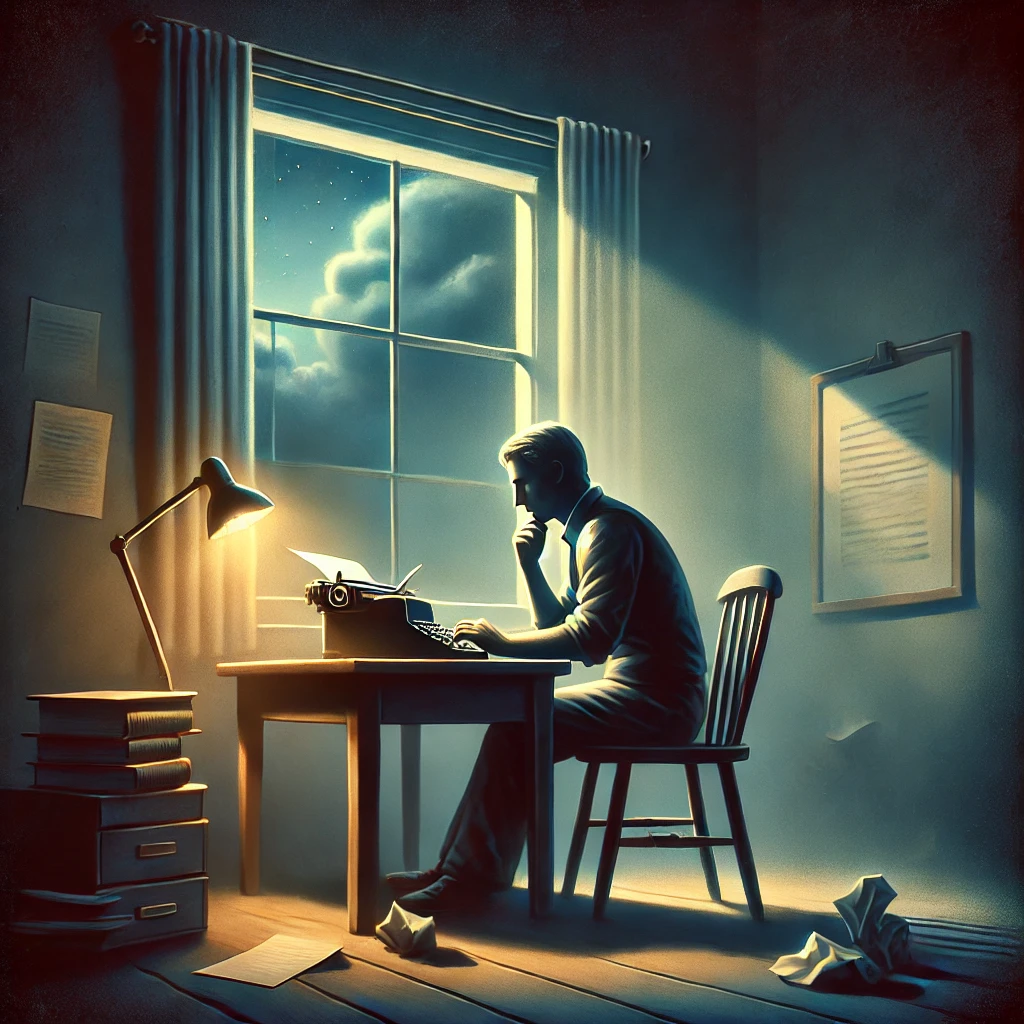Gotta Have Faith: Why Writers Should Embrace Uncertainty

The world of a writing career is often filled with uncertainty. Writers often struggle with unpredictable markets, changing reader preferences, and fluctuating sources of income. This unpredictability can lead to self-doubt and anxiety, which can affect the creative process and decision-making.
Key factors contributing to this uncertainty include:
- Market Dynamics: Trends in publishing and content consumption are constantly changing.
- Inner Critic: Self-doubt can hinder your willingness to take risks.
- Fear of Rejection: Constant scrutiny and feedback can create a paralyzing atmosphere.
Accepting uncertainty is crucial for writers who want to navigate their careers confidently. By embracing the unpredictability of the writing journey, you open yourself up to new opportunities. This mindset allows for greater creativity, adaptability, and emotional resilience.
As you learn to face uncertainty, you'll discover that it becomes an opportunity for growth instead of something to fear. The future may be unclear, but with a belief in your abilities and the process, you can thrive as a writer in this ever-changing world.
Understanding Uncertainty in Writing
Uncertainty is a constant companion for writers. Various factors contribute to this feeling, which can significantly affect decision-making processes.
Common Sources of Uncertainty:
- Inner Critic: This internal voice often amplifies self-doubt. Writers may question their abilities, leading to hesitancy in sharing their work.
- Fear of Rejection: The anxiety surrounding how others will perceive your writing can be paralyzing. This fear often prevents you from taking bold creative risks and exploring new ideas.
- Writer's Doubt: This encompasses feelings of inadequacy and questioning one's place in the literary world. Writers might feel that they lack the necessary talent or experience compared to peers.
These uncertainties can create a cycle of hesitation and anxiety. Engaging with these feelings instead of avoiding them fosters resilience. Acknowledging your inner critic, recognizing the fear of rejection, and confronting writer's doubt can transform uncertainty into a powerful driving force for growth and creativity. By facing these challenges head-on, you pave the way for deeper engagement with your craft and a more fulfilling writing journey.
Understanding the Emotional Impact of Uncertainty in Writing Careers
The writing industry is known for its unpredictability. Writers often face:
- Changes in the industry: Shifts in trends, publishing standards, and audience preferences can unexpectedly affect project outcomes and client expectations.
- Client demands: Dealing with different expectations can create confusion and stress, adding to the uncertainty surrounding project deliverables.
This unpredictable environment has a significant impact on writers' emotional well-being. The constant changes may lead to increased anxiety about:
- Self-worth: Writers often connect their identity to their work. When projects don't meet expectations or face rejection, self-esteem can suffer, leading to feelings of inadequacy.
- Anxiety during writing projects: The fear of not meeting client needs or producing subpar work can hinder creativity, creating a cycle of self-doubt.
It's important to understand these emotional challenges. By embracing uncertainty, writers can acknowledge that setbacks are part of the journey. Accepting this reality builds resilience, allowing them to navigate the ups and downs of their careers while keeping their love for writing intact.
Strategies to Confront and Embrace Uncertainty as a Writer
Confronting uncertainty in your writing journey involves practical techniques that can foster resilience and creativity. Here are some actionable steps to consider:
1. Question Worst-Case Scenarios
When fear arises, take a moment to identify what you fear the most. Write down these scenarios. Often, you'll find that the actual risk is minimal compared to the anxiety it generates.
2. Create Actionable Plans
Develop strategies to address each identified fear. Break down your writing projects into manageable tasks, setting realistic deadlines that accommodate potential uncertainties. This structured approach helps reduce overwhelm.
Cultivating creative courage is essential for thriving in an unpredictable environment. Consider these strategies:
3. Experimentation
Allow yourself to try new styles, genres, or formats without the pressure of perfection. Experimentation opens doors to innovative ideas and fresh perspectives.
4. Taking Risks
Embrace the unknown by submitting works that push boundaries. Sharing work outside your comfort zone can lead to unexpected connections and opportunities.
By implementing these strategies, you empower yourself to navigate uncertainty with confidence and creativity, transforming challenges into opportunities for growth.
Dealing with Readers in Uncertain Times
Writers often share a unique bond with their readers, particularly during periods of uncertainty. Acknowledging this shared experience is crucial. It fosters a connection with readers who may feel lost or anxious about their own circumstances.
1. Creating Community
Encourage open dialogue by inviting reader feedback. This approach not only validates their feelings but also promotes a sense of community. Collaborative engagement helps both writers and readers navigate challenges together.
2. Utilizing Storytelling
Storytelling serves as a powerful tool to explore themes of resilience and hope. Through narratives that reflect personal struggles and triumphs, writers can help readers find meaning amidst chaos. This connection deepens the emotional impact of your work, allowing readers to see themselves in the stories being told.
3. Emphasizing Shared Humanity
By sharing your uncertainties and vulnerabilities, you invite readers to reflect on their experiences. Acknowledging that uncertainty is a universal aspect of life creates a space for empathy and understanding.
Harnessing these strategies can enrich the relationship between writers and readers, transforming uncertainty into an opportunity for deeper connections and meaningful conversations.
Developing a Growth Mindset as a Writer Facing Uncertainty
Embracing a growth mindset is crucial for writers navigating the unpredictable landscape of their careers. This perspective encourages adaptability, allowing you to view challenges not as insurmountable obstacles but as valuable learning opportunities.
Consider the following approaches to cultivate this mindset:
- Reframe Setbacks: Rather than perceiving rejection or criticism as failures, interpret them as critical feedback that can guide your growth. Each setback is a stepping stone toward improvement.
- Celebrate Progress: Acknowledge even small achievements in your writing journey. Celebrating progress reinforces positive behavior and motivates ongoing effort.
- Seek Continuous Learning: Engage in workshops, online courses, or writing groups. Surrounding yourself with other writers fosters an environment of shared knowledge and support.
- Practice Self-Reflection: Regularly reflect on your experiences and the lessons learned from each project. This practice enhances self-awareness and promotes emotional resilience.
Adopting this mindset transforms uncertainty into an opportunity for personal and professional development. By embracing adaptability, you become more equipped to tackle challenges head-on, enhancing both your craft and confidence as a writer.
The Benefits Writers Can Get from Embracing Uncertainty
Embracing uncertainty can significantly enhance creativity and foster innovation in writing projects. When writers confront the unknown, they are pushed to think outside conventional boundaries. This shift opens doors to fresh ideas and unique perspectives. Here’s how this process unfolds:
1. Enhanced Creativity
Uncertainty encourages experimentation. Writers are more likely to explore unconventional storylines, characters, or styles when they accept that outcomes are unpredictable. This freedom often leads to unexpected literary gems.
2. Dynamic Process
The writing journey becomes a vibrant tapestry of exploration. As writers navigate the complexities of their narrative choices, they engage more deeply with their craft. This dynamic process keeps both the writer and reader intrigued.
3. Innovation in Storytelling
By welcoming uncertainty, writers can create narratives that reflect real-life complexities. These stories resonate with readers seeking authenticity and depth in their experiences.
4. Engagement with Readers
A writer's willingness to embrace unpredictable elements makes their work relatable. Readers appreciate stories that mirror their own uncertainties, fostering a deeper connection between writer and audience.
Embracing uncertainty transforms the writing experience into a profound adventure filled with potential for growth and discovery.
Practical Tips for Writers Navigating an Uncertain Landscape
Establishing effective daily routines can empower writers to maintain productivity despite the inherent uncertainties in their craft. Consider these strategies:
- Design a flexible schedule: Allow time for writing while accommodating unexpected events. Short, focused writing sessions can help maintain momentum.
- Incorporate breaks: Regular intervals for rest and reflection can rejuvenate creativity, helping you return to your work with fresh perspectives.
Goal setting is equally crucial in navigating uncertainty. Setting realistic and achievable goals helps manage expectations and fosters a positive mindset. Here are some tips:
- Break down larger projects: Divide your writing into smaller, manageable tasks. This makes goals feel attainable and provides frequent opportunities for accomplishment.
- Adjust goals as needed: Be open to revising your objectives based on your progress and shifting circumstances. Flexibility prevents feelings of overwhelm.
By integrating structured routines and adaptable goal-setting practices into your writing life, you cultivate resilience. This approach not only enhances productivity but also reinforces your ability to thrive amidst uncertainty.
FAQs (Frequently Asked Questions)
What role does uncertainty play in a writing career?
Uncertainty is a fundamental aspect of a writing career, as it influences decision-making and can lead to feelings of doubt and fear of rejection. Embracing this uncertainty is essential for writers to navigate their careers with confidence.
How can writers confront their fears related to uncertainty?
Writers can confront their fears by questioning worst-case scenarios and creating actionable plans to mitigate risks. Additionally, cultivating creative courage through experimentation and taking risks in their work can help them embrace uncertainty.
What emotional impacts does uncertainty have on writers?
The unpredictable nature of the writing industry can significantly affect writers' self-worth and lead to anxiety. Writers may experience emotional tolls due to client expectations and project outcomes that are often uncertain.
How can writers connect with readers during uncertain times?
Writers can acknowledge the shared experience of uncertainty with their readers, fostering open dialogue by inviting feedback. Utilizing storytelling to explore themes of resilience and hope helps create a sense of community amidst challenges.
What is the importance of developing a growth mindset as a writer?
Embracing a growth mindset allows writers to handle uncertainty positively, viewing challenges as valuable learning opportunities. This perspective encourages adaptability and personal development throughout their writing journeys.
What practical tips can help writers navigate an uncertain landscape?
Establishing daily routines that accommodate uncertainty while promoting productivity is vital. Additionally, setting realistic goals amidst unpredictability can help writers maintain focus and progress throughout various stages of the writing process.

Copyright 2025, Troy "the Plot Dude" Lambert, All Rights Reserved
“Plot Nihilists believe in nothing. Don’t be like them.”